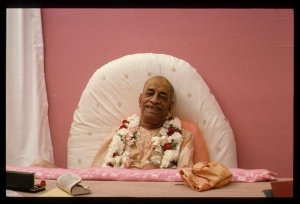CC Madhya 8.69: Difference between revisions
m (1 revision(s)) |
(Vanibot #0054 edit - transform synonyms into clickable links, which search similar occurrences) |
||
| (One intermediate revision by one other user not shown) | |||
| Line 1: | Line 1: | ||
{{ | [[Category:Sri Caitanya-caritamrta - Madhya-lila Chapter 08|C069]] | ||
<div style="float:left">'''[[Sri Caitanya-caritamrta|Śrī Caitanya-caritāmṛta]] - [[CC Madhya|Madhya-līlā]] - [[CC Madhya 8|Chapter 8: Talks Between Śrī Caitanya Mahāprabhu and Rāmānanda Rāya]]'''</div> | |||
<div style="float:right">[[File:Go-previous.png|link=CC Madhya 8.68|Madhya-līlā 8.68]] '''[[CC Madhya 8.68|Madhya-līlā 8.68]] - [[CC Madhya 8.70|Madhya-līlā 8.70]]''' [[File:Go-next.png|link=CC Madhya 8.70|Madhya-līlā 8.70]]</div> | |||
{{CompareVersions|CC|Madhya 8.69|CC 1975|CC 1996}} | |||
{{RandomImage}} | |||
==== TEXT 69 ==== | ==== TEXT 69 ==== | ||
<div | <div class="verse"> | ||
nānopacāra-kṛta-pūjanam ārta-bandhoḥ | :nānopacāra-kṛta-pūjanam ārta-bandhoḥ | ||
premṇaiva bhakta-hṛdayaṁ sukha-vidrutaṁ syāt | :premṇaiva bhakta-hṛdayaṁ sukha-vidrutaṁ syāt | ||
yāvat kṣud asti jaṭhare jaraṭhā pipāsā | :yāvat kṣud asti jaṭhare jaraṭhā pipāsā | ||
tāvat sukhāya bhavato nanu bhakṣya-peye | :tāvat sukhāya bhavato nanu bhakṣya-peye | ||
</div> | </div> | ||
| Line 14: | Line 18: | ||
==== SYNONYMS ==== | ==== SYNONYMS ==== | ||
<div | <div class="synonyms"> | ||
nānā- | ''[//vanipedia.org/wiki/Special:VaniSearch?s=nānā&tab=syno_o&ds=1 nānā]-[//vanipedia.org/wiki/Special:VaniSearch?s=upacāra&tab=syno_o&ds=1 upacāra]'' — by varieties of offerings; ''[//vanipedia.org/wiki/Special:VaniSearch?s=kṛta&tab=syno_o&ds=1 kṛta]'' — performed; ''[//vanipedia.org/wiki/Special:VaniSearch?s=pūjanam&tab=syno_o&ds=1 pūjanam]'' — worshiping; ''[//vanipedia.org/wiki/Special:VaniSearch?s=ārta&tab=syno_o&ds=1 ārta]-[//vanipedia.org/wiki/Special:VaniSearch?s=bandhoḥ&tab=syno_o&ds=1 bandhoḥ]'' — of the Supreme Personality of Godhead, who is the friend of all distressed persons; ''[//vanipedia.org/wiki/Special:VaniSearch?s=premṇā&tab=syno_o&ds=1 premṇā]'' — by ecstatic love; ''[//vanipedia.org/wiki/Special:VaniSearch?s=eva&tab=syno_o&ds=1 eva]'' — indeed; ''[//vanipedia.org/wiki/Special:VaniSearch?s=bhakta&tab=syno_o&ds=1 bhakta]-[//vanipedia.org/wiki/Special:VaniSearch?s=hṛdayam&tab=syno_o&ds=1 hṛdayam]'' — the heart of a devotee; ''[//vanipedia.org/wiki/Special:VaniSearch?s=sukha&tab=syno_o&ds=1 sukha]-[//vanipedia.org/wiki/Special:VaniSearch?s=vidrutam&tab=syno_o&ds=1 vidrutam]'' — melted in transcendental bliss; ''[//vanipedia.org/wiki/Special:VaniSearch?s=syāt&tab=syno_o&ds=1 syāt]'' — becomes; ''[//vanipedia.org/wiki/Special:VaniSearch?s=yāvat&tab=syno_o&ds=1 yāvat]'' — as long as; ''[//vanipedia.org/wiki/Special:VaniSearch?s=kṣut&tab=syno_o&ds=1 kṣut]'' — appetite; ''[//vanipedia.org/wiki/Special:VaniSearch?s=asti&tab=syno_o&ds=1 asti]'' — there is; ''[//vanipedia.org/wiki/Special:VaniSearch?s=jaṭhare&tab=syno_o&ds=1 jaṭhare]'' — in the stomach; ''[//vanipedia.org/wiki/Special:VaniSearch?s=jaraṭhā&tab=syno_o&ds=1 jaraṭhā]'' — strong; ''[//vanipedia.org/wiki/Special:VaniSearch?s=pipāsā&tab=syno_o&ds=1 pipāsā]'' — thirst; ''[//vanipedia.org/wiki/Special:VaniSearch?s=tāvat&tab=syno_o&ds=1 tāvat]'' — so long; ''[//vanipedia.org/wiki/Special:VaniSearch?s=sukhāya&tab=syno_o&ds=1 sukhāya]'' — for happiness; ''[//vanipedia.org/wiki/Special:VaniSearch?s=bhavataḥ&tab=syno_o&ds=1 bhavataḥ]'' — are; ''[//vanipedia.org/wiki/Special:VaniSearch?s=nanu&tab=syno_o&ds=1 nanu]'' — indeed; ''[//vanipedia.org/wiki/Special:VaniSearch?s=bhakṣya&tab=syno_o&ds=1 bhakṣya]'' — eatables; ''[//vanipedia.org/wiki/Special:VaniSearch?s=peye&tab=syno_o&ds=1 peye]'' — and drinkables. | ||
</div> | </div> | ||
| Line 21: | Line 25: | ||
==== TRANSLATION ==== | ==== TRANSLATION ==== | ||
<div | <div class="translation"> | ||
Rāmānanda Rāya continued, “‘As long as there is hunger and thirst within the stomach, varieties of food and drink make one feel very happy. Similarly, when the Lord is worshiped with pure love, the various activities performed in the course of that worship awaken transcendental bliss in the heart of the devotee.’ | Rāmānanda Rāya continued, “‘As long as there is hunger and thirst within the stomach, varieties of food and drink make one feel very happy. Similarly, when the Lord is worshiped with pure love, the various activities performed in the course of that worship awaken transcendental bliss in the heart of the devotee.’ | ||
</div> | </div> | ||
__NOTOC__ | |||
<div style="float:right; clear:both;">[[File:Go-previous.png|link=CC Madhya 8.68|Madhya-līlā 8.68]] '''[[CC Madhya 8.68|Madhya-līlā 8.68]] - [[CC Madhya 8.70|Madhya-līlā 8.70]]''' [[File:Go-next.png|link=CC Madhya 8.70|Madhya-līlā 8.70]]</div> | |||
__NOTOC__ | |||
__NOEDITSECTION__ | |||
Latest revision as of 00:00, 20 February 2024

A.C. Bhaktivedanta Swami Prabhupada
TEXT 69
- nānopacāra-kṛta-pūjanam ārta-bandhoḥ
- premṇaiva bhakta-hṛdayaṁ sukha-vidrutaṁ syāt
- yāvat kṣud asti jaṭhare jaraṭhā pipāsā
- tāvat sukhāya bhavato nanu bhakṣya-peye
SYNONYMS
nānā-upacāra — by varieties of offerings; kṛta — performed; pūjanam — worshiping; ārta-bandhoḥ — of the Supreme Personality of Godhead, who is the friend of all distressed persons; premṇā — by ecstatic love; eva — indeed; bhakta-hṛdayam — the heart of a devotee; sukha-vidrutam — melted in transcendental bliss; syāt — becomes; yāvat — as long as; kṣut — appetite; asti — there is; jaṭhare — in the stomach; jaraṭhā — strong; pipāsā — thirst; tāvat — so long; sukhāya — for happiness; bhavataḥ — are; nanu — indeed; bhakṣya — eatables; peye — and drinkables.
TRANSLATION
Rāmānanda Rāya continued, “‘As long as there is hunger and thirst within the stomach, varieties of food and drink make one feel very happy. Similarly, when the Lord is worshiped with pure love, the various activities performed in the course of that worship awaken transcendental bliss in the heart of the devotee.’